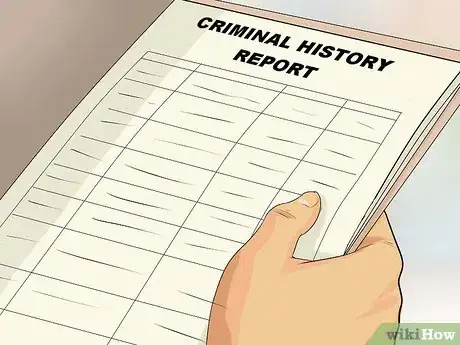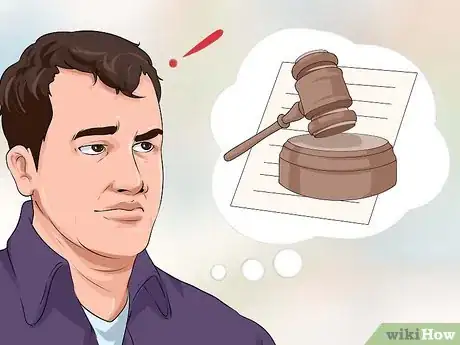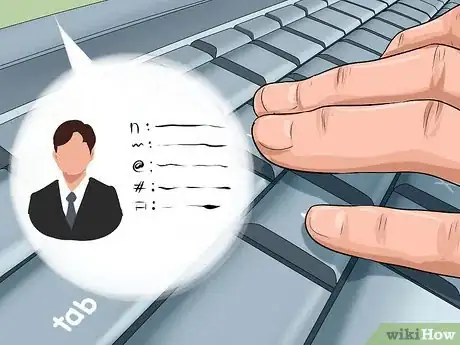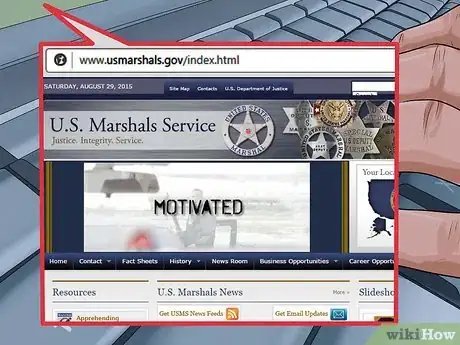This article was co-authored by Clinton M. Sandvick, JD, PhD. Clinton M. Sandvick worked as a civil litigator in California for over 7 years. He received his JD from the University of Wisconsin-Madison in 1998 and his PhD in American History from the University of Oregon in 2013.
This article has been viewed 95,365 times.
Whether you are an employer, a parent, a neighbor, or just curious, there may be times when you want to find out if someone is a sex offender. People are required to register as sex offenders when they have been convicted of a number of different types of criminal offenses. By using some basic resources that are available online and in your community, you can determine whether someone is a registered sex offender.
Steps
Using the Resources of Your Local Sheriff’s Department
-
1Obtain basic information about the person. No matter what steps you ultimately take to discover if the person is a sex offender, you will need to have some identifying information about him or her. Some things you may need to know about the person you intend to investigate include his or her:
- Address or basic geographic location. Many state and county databases allow users to search for sex offenders by address or to view a map of all sex offenders who are located in a specific geographic area.
- Name. Local sheriff’s departments or local court records can generally give you information about a specific person if enough information can be provided. The subject’s full name is a good start to finding out if he or she is a sex offender.
- License plate number. Some states allow users to run a search of the sex offender database based upon just a license plate number.
- Birthdate. While having a name and address is important, a birth date will allow you to be more specific about the person whose record you wish to check. Having this information also can prevent confusion when related, or even unrelated people, happen to have the same name. This is particularly the case if the person has a relatively common name. If you cannot get a birthdate, even having an approximate age is helpful in ensuring that you have the right person.
- Social security number. If you wish to determine whether a potential spouse or employee is a sex offender, you may have access to a social security number, which can help you get more accurate results.
- Other Identifying information. Whether or not you have a name, address, or birth date, you also may need to provide other identifying information such as height, weight, and a description of any distinguishing marks, such as scars or tattoos.
-
2Contact your local Sheriff’s Department. Most Sheriff’s Departments maintain a database of all registered sex offenders in the county. Contact your local Sheriff’s Department in person, online, or by telephone to see what resources are available to the public. Many departments have a specific person in charge of the sex offenders in the area who can provide you with detailed information about each offender and answer any questions you may have about the offenders in your area.
- Search the local Sheriff’s Department sex offender database online.
- Request a list of all outstanding criminal warrants in the county for sex-related crimes.
- Ask for a copy of the county’s “Most Wanted” list, if it maintains such a list.
Advertisement -
3Request a criminal history report. Many state police and county sheriff’s departments offer criminal history reports, which can provide you with a list of any felony arrests that a particular person has in that state. Check with your state police or local sheriff’s department to determine if it offers this service.[1]
- Some law enforcement agencies maintain various databases of information about local criminal activity. For instance, many county jails and state prisons maintain a database showing who is currently incarcerated and the crimes of which an individual was convicted. Other agencies publish a list of warrants that have been issued each day by the local court system. You also may be able to access all arrests made by local law enforcement agencies on a given day.
- Law enforcement agencies may charge a small fee to provide this information for you.
- You may need to have certain identifying information about the person in order to request a criminal history check.
- Be sure to check with law enforcement agencies in every state and local jurisdiction in which the individual has lived.
-
4Ensure that you do use this information legally. There are various state and federal laws that restrict what an employer or a financial institution can do with information about one's criminal history. These laws place limits on how this information can affect one's eligibility for housing, credit, and employment. The state laws that apply in a particular situation can vary widely from state to state.
- If you are just using the information that you obtain for your own personal knowledge, you generally will not violate any federal or state laws.
- Typically, if you derive your information from accurate public sources, there is nothing to prevent you from repeating the information, telling other people, or even publicizing it by, for example, posting it online. It is only when you repeat false information or confidential information that you have obtained illegally that you may run afoul of the law.
Searching Online for Sex Offender Information
-
1Locate your state’s online sex offender database through the Federal Bureau of Investigation’s (“FBI”) website. All states have set up an online database where users can search for registered sex offenders using different methods. States are required to establish and maintain these databases under federal law.
-
2Search your state’s sex offender online database. Some databases allow you to search by name, general location, specific address, social security number, and, in some states, even license plate number. The more information you have about the individual, the easier that it is to quickly narrow your search. However, even if you only know the general neighborhood in which the individual lives, you should be able to get a listing of all registered sex offenders in that neighborhood.
-
3Review the information that your state's online database provides. Each state provides users with different information about its registered offenders. Some states provide full names, addresses, the nature of the person’s criminal conviction, and even photos, while other states provide very little information online at all.
-
4Search other state online databases. If you know that an individual has lived in another state, you should search that state's online sex offender database as well. It is not unusual to find a sex offender listed in the databases of multiple states for the same offense. This occurs because the sex offender has moved from one state to another while he or she is still required to register as a sex offender. The individual has to register with the new jurisdiction when moving addresses, just as he or she did with the previous jurisdiction in which he or she lived.
-
5Run an online nationwide search. The U.S. Department of Justice (“DOJ”) maintains the Dru Sjodin National Sex Offender Public Website (“NSOPW”), which provides users with a way to search for sex offenders in all jurisdictions at once. This can be very useful in determining if a person is a registered sex offender in another county, state, U.S. Territory, or Indian tribe.[2]
-
6Use online services to search through public records and free databases. While some of these services will charge you a fee, there are several ways to access a large amount of public databases for free. These information sources can help you find out if an individual has ever been arrested, charged with, or convicted of, a sex-related crime.[3]
-
7Remember that public information is fair game. Information about whether a person is a registered sex offender is free and accessible to the public. Therefore, it is not illegal to possess this information, tell others about this information, or even post it online if you believe it to be true, accurate, and from a reliable source.
Running Background Checks
-
1Contact a private company that offers background checks. Some companies offer background checks for as little as $20. Be wary of these services, however, as you want to be sure that the company will provide you with complete and accurate information.
- Consider using FindOutTheTruth.com. This reputable private company was started by two private detectives in Florida and has been running background checks for users for almost 10 years. It is among the top rated background check services online, and offers background checks conducted by an actual private investigator. You can visit the FindOutTheTruth.com website for assistance.
- For other private companies that handle background checks, click here.
-
2Contact any government agencies that offer background checks. Some states offer criminal background checks to the general public for a small fee, usually $20 to $30, through their Bureau of Investigation or Criminal Apprehension divisions. Visit your state government’s website and run a search for background checks in your state to see if this is an option. You also can contact your state’s Department of Public Safety to determine if any of your state’s government offices offer background check services.
-
3Go beyond sex offender databases. Remember that not all sex offenders are registered. Furthermore, some sex offenders may no longer be required to register. Federal law enforcement agencies estimate that there are approximately 100,000 unregistered sex offenders in the United States. Some things you can do to help determine if someone is an unregistered sex offender or sexual predator include:[4]
- Run a basic online search. Running a search on persons’ name on your favorite search engine can provide you with a wealth of information, including current and previous addresses, as well as news and arrest reports. This is an especially helpful technique if the individual has an unusual or unique name.
- Check the U.S. Marshals Service website. The U.S. Marshal Service is in charge of apprehending unregistered sex offenders. This office provides news updates, as well as a most wanted sex offender list, on its website. Visit the U.S. Marshals Service website for help.[5]
- Search court records. Many counties allow users to search through public court records, which include both civil and criminal records. You can generally conduct a search in person or online through the County Clerk’s website or private or governmental services, such as Doxpop.com, Judici.com, or Courtreference.com. Look online or in your telephone book for your local clerk’s office. Their website may have information about how to search court records in your county and/or state, or you can call and ask about their available search options. You may also wish to contact an attorney and request that he or she conduct a search for you. Many attorneys subscribe to paid services that allow them to view records to which the general public does not have access.
-
4Hire a private investigator. If you are unable to turn up any useful information on your own or through online sources, you may wish to hire a private investigator. Many private agencies offer investigative services and may have access to resources or databases that the general public cannot access.
-
5Remember that are limits on the use of background check information. While it is perfectly legal to possess and pass on public information to others, federal and state laws limit how you can use this information to find another person eligible for housing, employment, and credit. So long as it is public information used only for your personal knowledge, however, you will not violate any laws.
Warnings
- Not all individuals who are registered as sex offenders actually committed a sex offense. For instance, depending on the state, individuals who have been convicted of prostitution, visiting a prostitute, urinating in public, public nudity, and sending nude pictures of oneself via cell phone all may have to register as sex offenders.⧼thumbs_response⧽
- Not all sex offenders are registered. Some individuals who have been convicted of sex crimes no longer are required to register. Other individuals may have been arrested for a sex crime, but were not charged or convicted of a sex crime, for whatever reason. Still other individuals may have successfully petitioned their states to be removed from the sex offender registry.⧼thumbs_response⧽
References
- ↑ http://www.nolo.com/legal-encyclopedia/question-criminal-record-check-another-person-28151.html
- ↑ http://www.nsopw.gov/Core/Portal.aspx?AspxAutoDetectCookieSupport=1
- ↑ http://www.pcworld.com/article/219593/how_to_do_an_online_background_check_for_free.html
- ↑ http://www.slate.com/articles/news_and_politics/jurisprudence/2014/08/sex_offender_registry_laws_by_state_mapped.html
- ↑ http://www.usmarshals.gov/index.html










































































